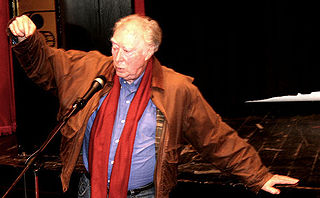A copyright is a type of intellectual property that gives its owner the exclusive right to copy, distribute, adapt, display, and perform a creative work, usually for a limited time. The creative work may be in a literary, artistic, educational, or musical form. Copyright is intended to protect the original expression of an idea in the form of a creative work, but not the idea itself. A copyright is subject to limitations based on public interest considerations, such as the fair use doctrine in the United States.
Moral rights are rights of creators of copyrighted works generally recognized in civil law jurisdictions and, to a lesser extent, in some common law jurisdictions.

The Toronto Eaton Centre is a shopping mall and office complex in the downtown core of Toronto, Ontario, Canada. It is owned and managed by Cadillac Fairview (CF). It was named after the Eaton's department store chain that once anchored it before the chain became defunct in the late 1990s.

Michael James Aleck Snow was a Canadian artist who worked in a range of media including film, installation, sculpture, photography, and music. His best-known films are Wavelength (1967) and La Région Centrale (1971), with the former regarded as a milestone in avant-garde cinema.

The copyright law of Canada governs the legally enforceable rights to creative and artistic works under the laws of Canada. Canada passed its first colonial copyright statute in 1832 but was subject to imperial copyright law established by Britain until 1921. Current copyright law was established by the Copyright Act of Canada which was first passed in 1921 and substantially amended in 1988, 1997, and 2012. All powers to legislate copyright law are in the jurisdiction of the Parliament of Canada by virtue of section 91(23) of the Constitution Act, 1867.
The Copyright Act of Canada is the federal statute governing copyright law in Canada. It is jointly administered by the Department of Industry Canada and the Department of Canadian Heritage. The Copyright Act was first passed in 1921 and substantially amended in 1988 and 1997. Several attempts were made between 2005 and 2011 to amend the Act, but each of the bills failed to pass due to political opposition. In 2011, with a majority in the House of Commons, the Conservative Party introduced Bill C-11, titled the Copyright Modernization Act. Bill C-11 was passed and received Royal Assent on June 29, 2012.
The Visual Artists Rights Act of 1990 (VARA),, is a United States law granting certain rights to artists.
Prise de parole is a Canadian book publishing company. Located in Greater Sudbury, Ontario, Canada, the company publishes French language literature, primarily but not exclusively by Franco-Ontarian authors.
Prise de parole Inc. v. Guérin, éditeur Ltée. is a leading Canadian case on moral rights in Canadian copyright law. The Federal Court of Canada found that the plaintiff's moral rights had not been violated because there was no objective evidence that the reproduction caused harm to his reputation.
Spanish copyright law governs copyright, that is the rights of authors of literary, artistic or scientific works, in Spain. It was first instituted by the Law of 10 January 1879, and, in its origins, was influenced by French copyright law and by the movement led by Victor Hugo for the international protection of literary and artistic works. As of 2006, the principal dispositions are contained in Book One of the Intellectual Property Law of 11 November 1987 as modified. A consolidated version of this law was approved by Royal Legislative Decree 1/1996 of 12 April 1996: unless otherwise stated, all references are to this law.
The copyright law of New Zealand is covered by the Copyright Act 1994 and subsequent amendments. It is administered by Business Law Policy Unit of the Ministry of Business, Innovation and Employment (MBIE). In June 2017, a review of the existing legislation was announced.
The Composers, Authors and Publishers Association of Canada was a Canadian copyright collective for the right to communicate with the public and publicly perform musical works. CAPAC administered these rights on behalf of its members and those of affiliated international organizations by licensing the use of their music in Canada. Royalties were paid to the music creators after administration costs were deducted to pay for the operation of CAPAC.
Moral rights in United Kingdom law are parts of copyright law that protect the personal interests of the author of a copyrighted work, as well as the economic interests protected by other elements of copyright. Found in the Copyright, Designs and Patents Act 1988, the moral rights are the right to be identified as the author of a work, known as the right of paternity, the right to object to derogatory treatment of a work, known as the right of integrity, the right not to be identified as the author of someone else's work, and the right to privacy. The right of paternity exists for the entire copyright term, and requires individuals who commercially broadcast, sell, perform or exhibit literary, dramatic, musical or artistic works to identify the author of the work – but this does not apply to things such as typefaces, encyclopaedias or works subject to crown copyright.
Moral rights in Canadian copyright law are protected under the Copyright Act of Canada and include an author's right to attribution, integrity and association of a work. Moral rights are to be distinguished from economic rights; moral rights essentially being derived from the reflection of the author's personality in his or her work, whereas economic rights grant an author the ability to benefit economically from their work. An author of a work retains moral rights for the length of the copyright, even if the copyright has been assigned or licensed to another party. Moral rights cannot be assigned or licensed, but can be waived by contract.

Amar Nath Sehgal v. Union of India is a landmark Indian case decided by the Delhi High Court, which for the first time upheld the moral right of an author under the Indian Copyright Act and awarded damages. The government was also asked to return his mural.

Monty Python v. American Broadcasting Companies, Inc. was a case where the British comedy group Monty Python claimed that the American Broadcasting Company (ABC) had violated their copyright and caused damage to their artistic reputation by broadcasting drastically edited versions of several of their shows. An appeals court found in favor of Monty Python, directing a ban of further broadcasts by ABC on the basis of violation of the Lanham Act, which could provide protection in the United States similar to that provided by moral rights in Europe, and gave the opinion that the group's copyright had probably also been infringed.
Mannu Bhandari v. Kala Vikas Motion Pictures Ltd is a landmark case in the area of Indian copyright law. It is the first decision from the Indian higher judiciary that clarified the scope and ambit of moral rights under the Indian copyright law.

Flight Stop, also titled Flightstop, is a 1979 site-specific art work by Canadian artist Michael Snow. Located in the Toronto Eaton Centre in Downtown Toronto, the work hangs from the ceiling and appears to depict sixty Canada geese in flight. Each individual goose is made of Styrofoam covered in fibreglass and covered in a sheath made from photographs taken from a single goose. The flock is frozen in mid-flight, "flight stop" being a pun on the nature of still photography. When conceived in 1977, the work was titled Flight Stop but has frequently also been titled Flightstop. The work remains an iconic public art piece in Toronto and in many ways stands as a visual identity for the mall.






